Used Commercial Vehicles: Complete Buyer's Guide 2025
Looking to buy or sell a used commercial vehicle? This guide covers everything from pricing, inspection, paperwork, and tips to get the best deal.
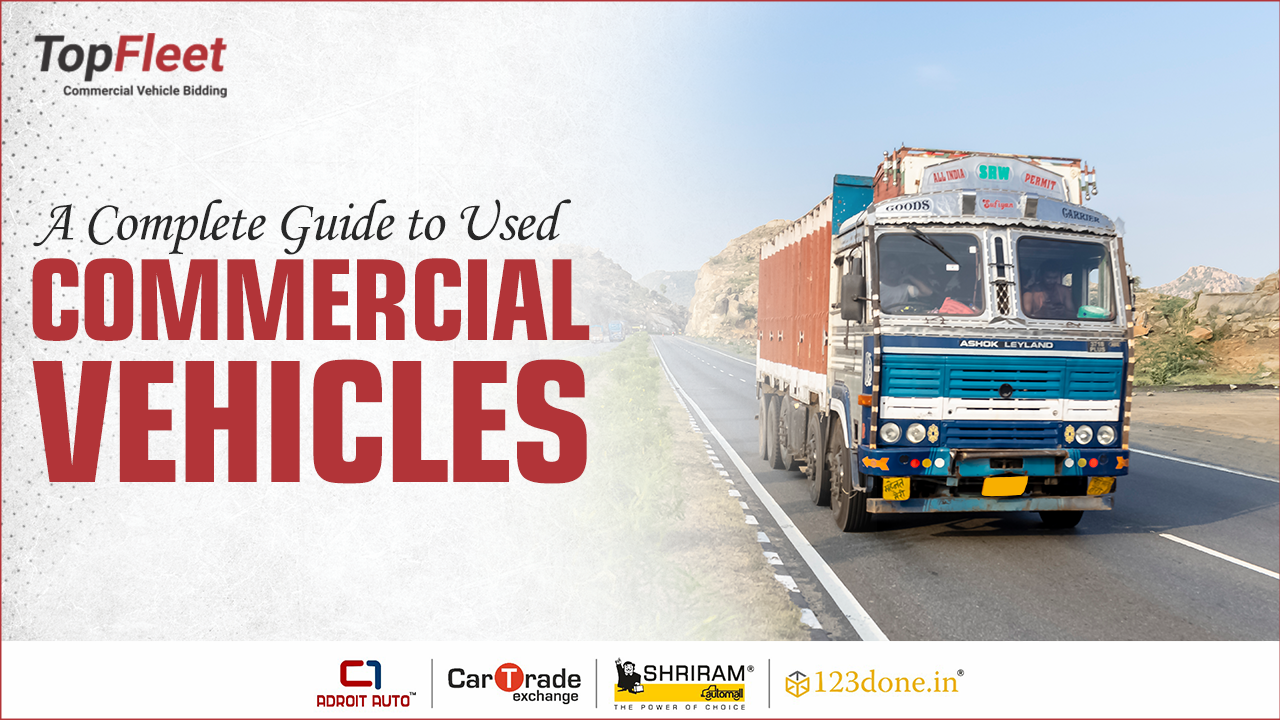
A Complete Guide to Used Commercial Vehicles
Any motor vehicle designed to carry or transport goods, passengers, or services that generates an income is known as a commercial vehicle. It is primarily used for commercial purposes with a wide range of vehicles including trucks, vans, buses, ambulances, school buses, etc. Any commercial vehicle can be a broad part of a motor vehicle depending upon its specifications, and uses. Unlike the general private vehicles that are meant for personal uses, commercial vehicles are used for heavy-duty operations, and long distance works only. These vehicles are vital assets for companies aiming to deliver products, provide services, or carry equipment across various distances.
Types of Commercial Vehicles
Depending on the purpose of the work, various types of commercial vehicles are used. Let us learn about them based on their distinct specifications and work.
Light Commercial Vehicles (LCVs)
Light commercial vehicles are small-to-medium-sized vehicles with a gross vehicle weight not exceeding 3.5 tonnes. These commercial vehicles are ideal for urban logistics, deliveries, and small business operations. Examples include delivery vans, small pickups, and mini trucks.
Benefits:
-
Urban Accessibility: Easily navigates narrow city roads and congested areas.
-
Fuel Efficiency: Lower fuel consumption compared to heavier vehicles.
-
Quick Deliveries: Ideal for last-mile delivery services and courier businesses.
-
Lower Maintenance Costs: Generally cheaper to service and repair.
-
Flexible Use: Can be used for both goods and small-scale service transport.
Examples:
-
Tata Ace – A compact, fuel-efficient mini-truck used widely for intra-city delivery
-
Mahindra Bolero Pickup – Rugged build, used for small businesses and market transport
-
Maruti Suzuki Eeco Cargo – Popular among e-commerce companies for light parcel delivery
-
Ford Transit – A global favourite for courier and logistics services
Heavy Commercial Vehicles (HCVs)
Heavy commercial vehicles are large trucks and trailers used for transporting goods over long distances. These commercial vehicles are commonly seen on highways and industrial zones. These include containers, tippers, and articulated lorries.
Benefits:
-
High Load Capacity: Designed to carry heavy and bulk cargo efficiently.
-
Long-Distance Hauling: Ideal for intercity and interstate freight operations.
-
Durability: Built to endure rough terrains and long hours on the road.
-
Business Scalability: Supports the growth of large-scale logistics and manufacturing operations.
-
Customisation: Can be adapted for different freight types like refrigerated goods, oil, or construction materials.
Examples:
-
Ashok Leyland 3718 – Commonly used for long-haul goods movement in India
-
Tata Prima 5530 – Known for high payload capacity and driver comfort on long routes
-
BharatBenz 4023T – Favoured in logistics and FMCG industries for its reliability
-
Volvo FH Series – A global leader in heavy-duty haulage across countries
Passenger Commercial Vehicles
These vehicles are designed to carry passengers and include buses, minibuses, vans, and taxis used in public or private transportation.
Benefits:
-
Mass Transit Solutions: Efficiently moves large groups of people, reducing traffic congestion.
-
Revenue Generation: Earns consistent income through fares and rental services.
-
Tourism Support: Vital for tour operators and travel agencies.
-
School and Employee Transport: Widely used for educational institutions and corporate shuttles.
-
Custom Comfort Options: Can be equipped with AC, entertainment systems, and ergonomic seating.
Examples:
-
Force Traveller – Widely used for staff transport, school buses, and tourist groups
-
Ashok Leyland Lynx – A mid-sized bus used in public and private fleets
-
Toyota HiAce – Popular in the tourism sector and as a shuttle service vehicle
-
Tata Winger – Used for airport shuttles, hospitals, and private charters
Construction Commercial Vehicles
Specialised commercial vehicles used in the construction industry, including dump trucks, concrete mixers, cranes, and backhoe loaders.
Benefits:
-
Heavy-Duty Performance: Designed for transporting and handling construction materials and equipment.
-
Time Efficiency: Speeds up large-scale construction and infrastructure projects.
-
Reduced Labour Dependency: Automates tasks like digging, lifting, and mixing concrete.
-
Safety Features: Built with reinforced bodies and features to minimise onsite accidents.
-
Custom Functions: Adaptable to different construction needs through attachments and configurations.
Examples:
-
JCB 3DX Backhoe Loader – A versatile machine for digging and lifting
-
Tata Signa 2823.K – A high-performance tipper used for transporting sand and gravel
-
Schwing Stetter Transit Mixer – Specialised in mixing and transporting concrete
-
Volvo EC210 Excavator – Used for digging, site clearing, and demolition
Whether it's a nimble van delivering parcels or a heavy truck hauling industrial cargo, every commercial vehicle serves a specific role in modern industry. Choosing the right type of commercial vehicle—be it for transporting goods, moving people, or constructing buildings—can make all the difference in operational success and profitability. With the right investment, businesses can enjoy enhanced productivity, lower costs, and long-term growth.
Why Choose Used Commercial Vehicles?
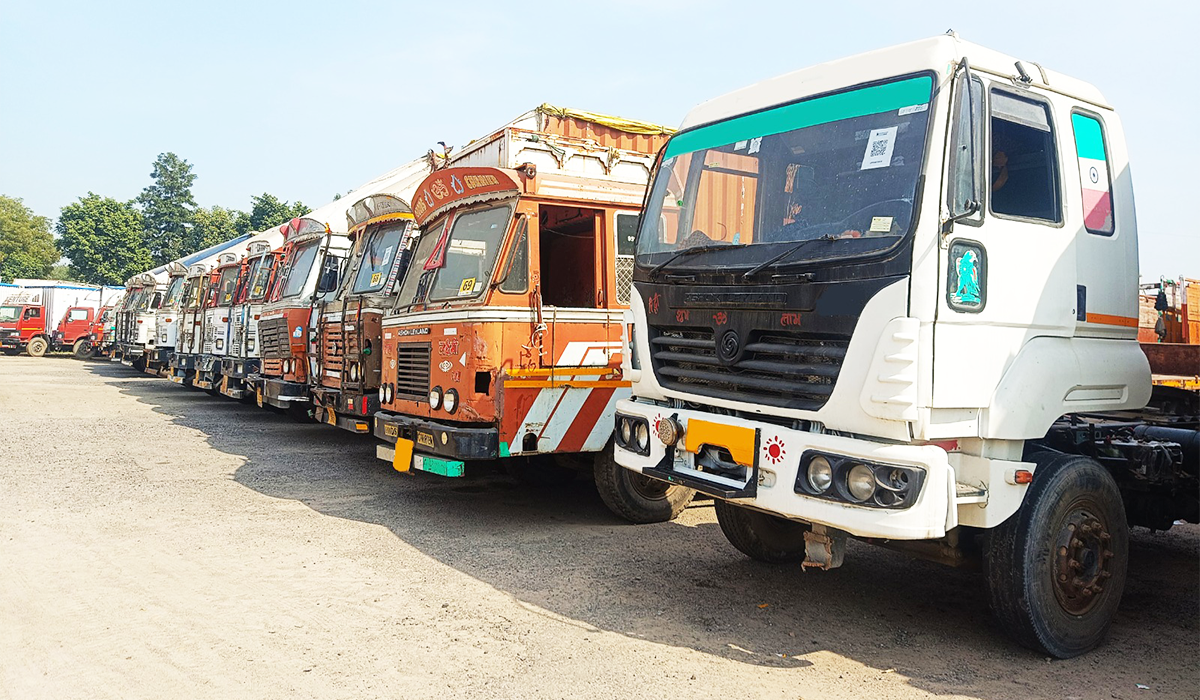
In today's competitive economy, businesses—especially small and medium enterprises—are constantly looking for ways to cut costs without compromising on quality. One of the most effective ways to achieve this is by choosing used commercial vehicles. Whether you run a logistics firm, a construction company, a transport service, or an agricultural venture, opting for pre-owned vehicles can be a game-changing decision.
Let’s explore the reasons why used commercial vehicles are becoming the preferred choice across industries.
Significant Cost Savings
The biggest advantage of buying used commercial vehicles is the lower upfront cost. New trucks, vans, or buses can take a huge bite out of your capital. In contrast, used vehicles come at a fraction of the price, freeing up funds for other business needs like hiring, inventory, or marketing. The cost-effective nature of buying old commercial vehicles or any vehicle for that matter is the biggest advantage indeed.
Example: A new Tata 407 might cost over ₹12 lakh, while a well-maintained 2–3-year-old model may cost only ₹6–7 lakh.
Lower Depreciation Rate
New vehicles depreciate the moment they leave the showroom—often losing 20–30% of their value in the first year. Used commercial vehicles, however, have already gone through this steep depreciation phase. This means your investment holds its value better over time, making it a more stable financial decision. An old commercial vehicle would have gone through significant depreciation during its initial years of purchase, hence making it a smart purchase.
Wider Vehicle Variety Within Budget
Buying used commercial vehicles opens up a wide range of makes, models, and variants that might have been too expensive when new. You can afford higher-spec vehicles, better payload capacities, or even multiple vehicles for the price of one new one. Your budget would easily include several old commercial vehicles with more upgradations and features without sky-rocketing the prices.
Example: Instead of one brand-new mini truck, you could buy two reliable used vans for the same budget and expand your fleet instantly.
Faster Return on Investment (ROI)
Since the initial cost is lower, businesses typically see a quicker return on investment with used commercial vehicles. This is especially true for seasonal industries or startups where rapid profitability is critical.
Reliable Performance with Maintenance Records
Most used commercial vehicles today are sold with full-service histories and inspection reports, especially through certified dealers. With regular maintenance and proper servicing, these vehicles can run efficiently for several more years.
Pro Tip: Always check the service log and kilometre history. A well-documented vehicle is usually a safer bet.
Lower Insurance Premiums
Insurance costs for used commercial vehicles are usually lower compared to new ones. This is because the insured declared value (IDV) is based on the current market value, not the original price—resulting in annual savings.
Sustainable and Eco-Friendly Choice
Buying pre-owned vehicles helps in reducing manufacturing demand and carbon emissions, making it an eco-conscious decision. You’re essentially extending the life cycle of a vehicle and reducing its overall environmental impact.
Immediate Availability
While new commercial vehicles often involve booking periods and delivery delays, used commercial vehicles are readily available. For businesses needing urgent fleet expansion or replacement, this instant access can be critical.
Choosing used commercial vehicles is not just about saving money—it's about making a smart, sustainable, and strategic business decision. With lower costs, dependable performance, reduced depreciation, and faster ROI, pre-owned vehicles offer immense value for companies looking to scale quickly without overspending.
Whether you're a startup, an SME, or a fleet manager looking to optimise your operational costs, used commercial vehicles could be the key to driving your business forward.
Things to Check Before Buying a Used Commercial Vehicle
Buying a used commercial vehicle can be a smart financial decision, especially for small businesses and fleet operators looking to expand operations without bearing the cost of a brand-new vehicle. However, the pre-owned market comes with its own set of risks. To ensure you're making a worthwhile investment, it's crucial to conduct a thorough inspection and verification process.
Here’s a comprehensive checklist of things to check before buying a used commercial vehicle.
Verify Vehicle Registration and Documents
You should always begin with verifying all legal documents:
-
Registration Certificate (RC): Ensure that the RC is original, not a duplicate. It should match the chassis number and engine number on the vehicle.
-
Permit Papers: Commercial vehicles require specific permits to operate in various states. Check for state/national permits, and whether they are transferable.
-
Insurance Documents: Confirm that the insurance is valid and check the type of coverage. Also, ensure there are no claims that could indicate repeated issues or accidents.
-
PUC Certificate: Pollution Under Control certificate must be current.
-
Road Tax Receipt: A clear road tax payment record means no hidden liabilities.
Thorough verification of documentation protects you from future legal and financial headaches.
Check Vehicle History
Understanding the vehicle’s past can give valuable insight into its condition and longevity:
-
Previous Ownership: Fewer previous owners usually mean better maintenance and less wear and tear.
-
Service Records: Ask for complete service history to assess how well the vehicle was maintained.
-
Accident History: Look for signs of previous accidents, structural damage, or insurance claims.
-
Odometer Reading: Confirm that the mileage hasn’t been tampered with and cross-verify with service records.
Online platforms like Vahan (in India) can help you access official details of the vehicle by using the registration number.
Inspect Engine and Transmission
The engine is the heart of a commercial vehicle, so check:
-
Start-Up Condition: A cold start test will reveal issues like hard starting, abnormal smoke, or unusual noises.
-
Engine Sound and Vibration: Excessive noise or vibration could indicate underlying engine problems.
-
Oil Condition: Check for oil leaks and the colour of the oil. Sludge or discolouration means poor maintenance.
-
Transmission: Test the gear shifting – it should be smooth without jerks or resistance.
Hiring a trusted mechanic to perform a detailed inspection is highly recommended.
Evaluate the Chassis and Body
A strong chassis is vital for commercial use, especially for transporting heavy loads:
-
Rust and Corrosion: Inspect for rust on the underbody, frame, and joints.
-
Cracks and Welds: Look out for any signs of structural damage or poor welding, which might suggest previous accidents or overuse.
-
Body Panels: Uneven gaps, dents, or mismatched paint may indicate past damage.
Check the Tyres and Suspension
Tyres and suspension significantly affect ride quality and maintenance cost:
-
Tyre Condition: Uneven wear could mean alignment or suspension issues. Ensure tread depth is within legal limits.
-
Spare Tyre and Tools: Ensure the spare tyre, jack, and necessary tools are present and in good condition.
-
Suspension Test: Take a test drive to feel for vibrations, noises, or bounce that could suggest worn-out shock absorbers or leaf springs.
Inspect the Cabin and Interiors
Comfort and safety in the driver's cabin are essential, especially for long hauls:
-
Seats and Controls: Check for torn upholstery, functioning seat adjustments, and working levers.
-
Dashboard Electronics: Test lights, indicators, horn, A/C, music system, and other electronic functions.
-
Visibility: Ensure windshields, mirrors, and wipers are in working order.
Brake and Clutch System
A failing brake or clutch can be dangerous and expensive to repair:
-
Brake Test: Check for squeaking, delayed response, or spongy brake feel.
-
Clutch Performance: Test for smooth engagement and disengagement. A high clutch pedal may indicate wear.
Take a Test Drive
Never finalise a purchase without a proper test drive. Drive in varied conditions – city traffic, open roads, inclines – to assess overall performance. Pay close attention to how the vehicle handles, brakes, accelerates, and turns.
Get a Professional Inspection Report
If you're not mechanically inclined, invest in a third-party inspection service. Many companies offer used vehicle inspection reports with detailed diagnostics, giving you peace of mind and negotiation leverage. Companies like Adroit Auto provide extensive inspection services providing genuine reports.
Price Evaluation and Negotiation
Compare prices on online classified platforms to gauge the market value. Use insights from inspections and history checks to negotiate a fair deal. Also, consider future costs like repair, insurance renewal, and maintenance. You can even go for AI powered price prediction tools like ThePrice X which can very efficiently predict the price of the old commercial vehicle that interests you.
Buying a used commercial vehicle is more than just finding a good deal – it's about ensuring reliability, safety, and legal compliance. With this thorough checklist, you can minimise risks and make an informed decision that supports your business needs. Always remember – a little diligence now can save you a lot of money and stress later. Trust can be placed in best marketplaces for pre-owned vehicles like Shriram Automall India Ltd. for best deals and great transactions.
Where to Buy Reliable Used Commercial Vehicles
In a fast-paced, budget-conscious world, buying old commercial vehicles is an increasingly preferred choice for fleet operators, logistics companies, small business owners, and even individual entrepreneurs. From light commercial vehicles to heavy-duty trucks and buses, pre-owned options present an affordable and practical solution. But the challenge lies in finding a reliable source where these vehicles are not only available but also verified, well-maintained, and sold through a transparent process.
When looking to buy used commercial vehicles in India, reliability is key. Whether you're searching for an Ashok Leyland truck, a Tata mini-truck, or a multi-axle long-haul transport vehicle, it is essential to deal with sellers and platforms that offer credibility, documentation clarity, and assurance in quality. The question is — where can you find such assurance?
Let’s explore the best route to owning reliable, used commercial vehicles and understand why Shriram Automall is widely considered one of the most trusted names in the business.
Understanding the Demand for Old Commercial Vehicles
India's transportation and logistics sectors are evolving rapidly, with businesses continuously seeking cost-effective expansion options. Buying new vehicles may not always be financially feasible, especially for smaller enterprises or operators with large fleets. This is where the pre-owned commercial vehicle market becomes a viable alternative.
Used vehicles offer lower upfront costs, reduced depreciation losses, and quicker ROI — especially when the vehicle is in good condition. But these benefits only come when you buy from the right source.
Poorly maintained or unverified vehicles can become a liability, leading to frequent breakdowns, compliance issues, or worse — loss of business due to delays. That’s why turning to structured platforms offering verified listings, auction transparency, and documentation support is crucial.
Where to Start Looking Used Commercial Vehicles?
Your search for reliable old commercial vehicles can take you down various routes:
-
Local Dealers: Easily accessible but often lack transparency or standardised pricing.
-
Online Classifieds: Offer variety, but buyer protection is limited.
-
OEM Used Vehicle Divisions: Provide some reliability but limited inventory and price flexibility.
-
Organized Vehicle Auctions and Platforms: These offer verified listings, better pricing through auctions, and nationwide access.
Among these, the last option — organized platforms — has been steadily gaining popularity. One name that has stood out in this space is Shriram Automall.
Why Shriram Automall Is a Trusted Name in Used Commercial Vehicles
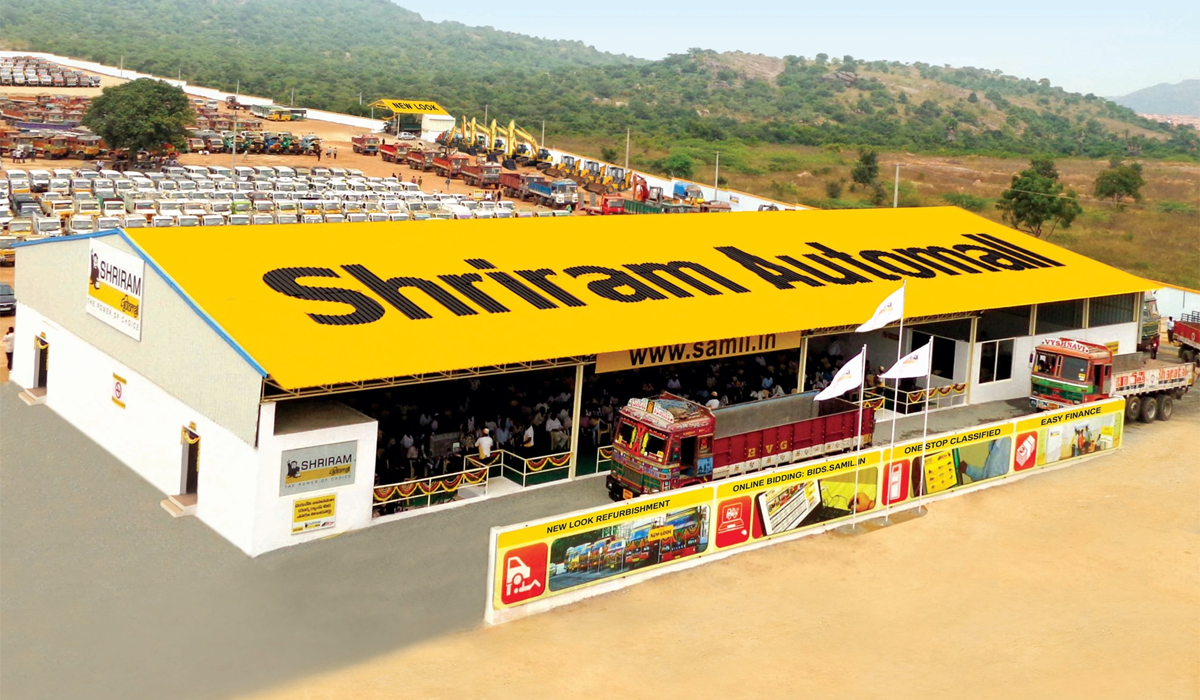
Established to create a structured marketplace for pre-owned vehicles and equipment, Shriram Automall India Limited (SAMIL) has become synonymous with reliability, transparency, and reach in the used commercial vehicle segment.
With over a decade of expertise and the backing of the Shriram Group, the company has revolutionised how commercial vehicles are bought and sold in India. Whether you're in the market for heavy trucks, trailers, buses, or small commercial vehicles, Shriram Automall provides a one-stop solution.
Here’s why thousands of buyers across India trust Shriram Automall:
Benefits of Buying from Shriram Automall
1. Pan-India Presence
With over 100 Automall locations spread across the country, Shriram Automall offers unmatched accessibility. Whether you are in a metro city or a Tier II or Tier III town, there's likely a Shriram Automall facility near you. This widespread network ensures that buyers and sellers from all corners of India can connect seamlessly.
2. Verified Inventory
Every vehicle at Shriram Automall undergoes a detailed inspection process. This includes checking engine performance, chassis condition, tyres, and documentation. Buyers get access to a verified inventory, which greatly reduces the risks typically associated with buying used commercial vehicles. Photographs, inspection reports, and service history (where available) are shared transparently, helping you make informed decisions.
3. Transparent Auctions
Unlike traditional dealers where prices are often arbitrary, Shriram Automall facilitates transparent bidding through its live physical and online auctions. This competitive process helps you get the best price for the vehicle without hidden charges or middlemen commissions. The auction model promotes fairness and allows real-time participation.
4. Wide Range of Vehicles
Shriram Automall offers an impressive range of commercial vehicles, from top brands like Tata Motors, Ashok Leyland, Eicher, BharatBenz, and Mahindra. Whether you need a 2-tonne light carrier, a 10-wheeler dumper, or a 54-seater bus, the platform caters to multiple business needs.
5. Financing and Documentation Support
One of the lesser-known but vital advantages of buying from Shriram Automall is the financing assistance provided through tie-ups with NBFCs and banks. The Automall team also helps with ownership transfer, RTO formalities, and insurance renewal — making the post-purchase process smooth and hassle-free.
Online Bidding Made Easy: CarTradeExchange.com and bids.samil.in
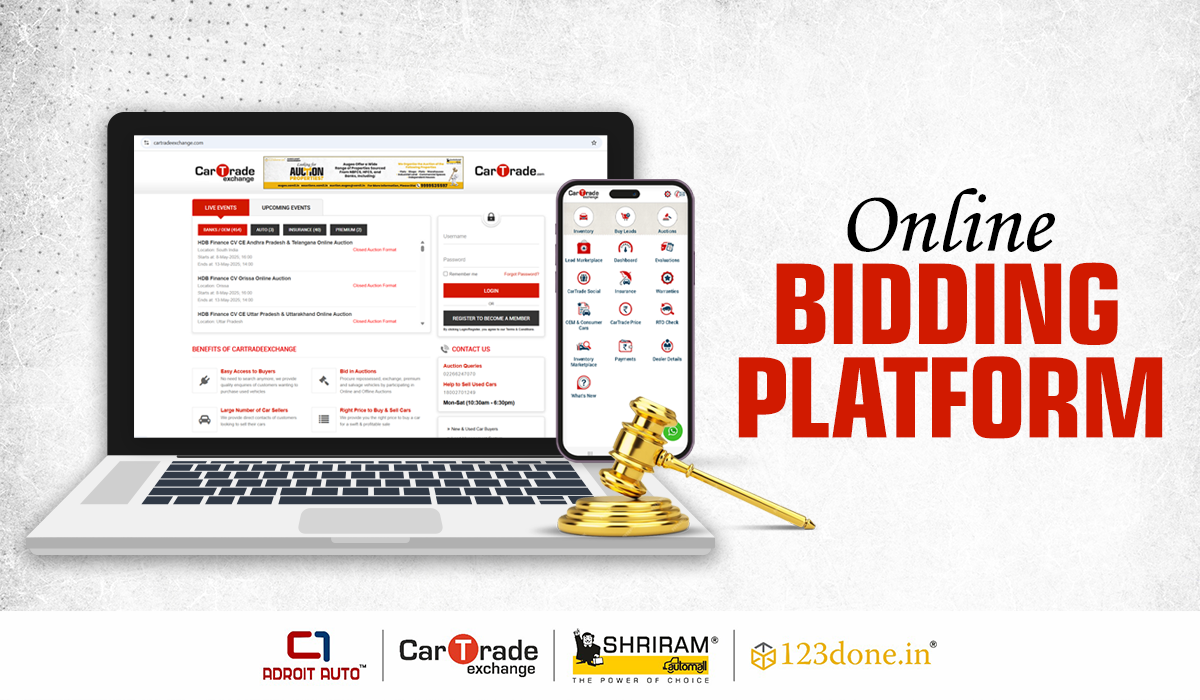
In a digital-first world, convenience is paramount. Recognising this shift, Shriram Automall also provides online bidding platforms where buyers can participate in auctions from anywhere in India — even from their mobile phones.
CarTradeExchange.com
CarTradeExchange is a multi-brand, digital used vehicle auction platform that allows buyers to view, bid, and purchase vehicles with complete transparency. It's especially useful for fleet operators and dealerships that want to browse multiple listings at once, compare prices, and make faster decisions without physically visiting a location.
bids.samil.in
Shriram Automall’s own digital auction platform, bids.samil.in, is another powerful tool that brings the auction floor to your fingertips. Registered users can log in, view upcoming auctions, inspect vehicle listings with photos and details, and place bids live. The platform also includes customer support and bidding assistance, ensuring a smooth online experience even for first-time users.
With features like real-time bidding, instant alerts, and e-payment integration, both platforms offer speed, safety, and scalability — perfect for individuals and businesses alike.
Trust the Experts, Not Just the Ads
While buying a used commercial vehicle may seem straightforward, the real challenge lies in ensuring quality and legitimacy. Choosing the right platform saves you from potential financial losses, mechanical headaches, and operational downtime. In that respect, Shriram Automall goes beyond the basic buyer-seller model to offer a structured, dependable, and transparent experience.
Whether you're a transporter looking to expand your fleet, a startup needing delivery vans, or a rural entrepreneur searching for a cost-effective pickup truck, Shriram Automall is your trusted partner.
And for the digitally inclined, CarTradeExchange.com and bids.samil.in bring the entire buying experience online — safely and securely.
Reliable commercial vehicles, verified inventory, transparent auctions, and Pan-India service — this is what makes Shriram Automall the go-to name in India’s pre-owned vehicle market.
Maintenance Tips to Maximise Value of Used Commercial Vehicles
Owning a used commercial vehicle is a smart business move. It saves on upfront costs, reduces depreciation losses, and allows faster return on investment — especially for small fleet operators and logistics businesses. But to truly extract long-term value and ensure performance, regular maintenance is key. A well-maintained pre-owned commercial vehicle not only lasts longer but also retains better resale value and ensures safety, compliance, and operational efficiency.
Here’s a comprehensive guide to help you maximise the value of your used commercial vehicle through effective maintenance practices.
Begin with a Thorough Inspection
Whether your vehicle was purchased from an organised source like Shriram Automall or a local dealer, begin with a full inspection. This includes:
-
Engine condition and performance
-
Brake systems
-
Tyres and suspension
-
Battery health
-
Cooling system
-
Chassis and frame integrity
-
Cabin and electricals
-
Exhaust emissions
If the vehicle came with a condition report or certification, use it as a benchmark for future checks. Address any minor issues early on — postponing repairs could lead to expensive breakdowns down the line.
Follow a Strict Servicing Schedule
Used commercial vehicles often come with an unpredictable service history. To prevent further wear, establish a fixed servicing routine immediately after purchase.
-
Engine oil and filters should be changed at regular intervals, ideally every 10,000–15,000 km or as advised by the manufacturer.
-
Transmission oil, brake fluid, coolant, and differential oil need timely replacements to prevent system failures.
-
Air filters must be cleaned or replaced frequently to maintain fuel efficiency and engine performance.
Partner with a trusted service centre or assign an in-house mechanic if you manage a fleet.
Keep Tyres in Check
Tyres are not just about road grip — they affect fuel efficiency, safety, and suspension wear. Rotate tyres every 10,000 km and keep them aligned and balanced. Always check tyre pressure and ensure it’s consistent with the load the vehicle carries.
Worn-out or mismatched tyres should be replaced promptly. Uneven wear patterns can indicate deeper suspension or alignment issues.
Prioritize Brake Maintenance
For commercial vehicles, brake systems endure more strain than private cars. Regular inspection of brake pads, linings, rotors, and fluids is essential, especially for heavy vehicles that transport goods or passengers.
Avoid overloading, as it accelerates brake wear. If your vehicle features ABS or other advanced braking systems, ensure the sensors and electronics are also periodically checked.
Check Suspension and Chassis
Suspension components like shock absorbers, leaf springs, and bushings wear out faster in pre-owned commercial vehicles — especially if they’ve been used for long hauls or rural routes.
A damaged suspension not only makes the ride uncomfortable but can also destabilise the vehicle during turns or under load. Periodic greasing of joints and tightening of fasteners helps in keeping the chassis and suspension in good condition.
Maintain Electrical and Lighting Systems
From headlights and tail-lamps to dashboard displays and GPS systems, electricals should function flawlessly, especially for intercity operations and night driving.
Regularly check the battery terminals, wiring, alternator, and fuses. Weak or inconsistent electrical output may indicate deeper alternator issues that should not be ignored.
Cleanliness Adds Longevity
It might sound basic, but regular cleaning — both interior and exterior — helps in maintaining the vehicle’s value. Mud, salt, or chemical build-up can corrode the underbody and body panels. Pressure washing and applying rust protection can keep the frame and paintwork intact, especially during monsoon months.
The cabin too should be kept clean and odour-free. This not only improves driver morale but also protects electronics, upholstery, and air conditioning units from dust damage.
Keep Records of All Maintenance
Document every service, repair, and part replacement. This record helps in:
-
Tracking wear and tear
-
Predicting future maintenance
-
Strengthening resale value when you plan to upgrade
-
Establishing warranty claims if applicable
Buyers are more confident when they see well-documented vehicle histories, especially for commercial use where reliability is non-negotiable.
Use Genuine Parts and Fluids
Avoid cutting corners with cheap spares. Using counterfeit or substandard parts may seem like a cost-saving measure initially but can damage the vehicle in the long run and reduce resale potential. Always insist on OEM (Original Equipment Manufacturer) or high-quality aftermarket parts approved for your specific vehicle model.
Similarly, using low-grade engine oil or coolant can lead to internal damage that will be far more expensive to fix than investing in the right fluid from the outset.
Monitor Driving Behaviour
A vehicle is only as good as the person driving it. Encourage drivers to avoid rash driving, excessive idling, and over-revving. Defensive and economical driving helps reduce wear and fuel costs while increasing engine life. For fleet operators, consider installing telematics to monitor driving habits in real-time.
Regular upkeep not only extends the lifespan of the vehicle but ensures compliance with safety standards, reduces unexpected breakdowns, and sustains optimal performance. In an increasingly competitive business environment, well-maintained vehicles can give you that extra edge — in profitability, reputation, and peace of mind.
Treat your pre-owned commercial vehicle like an asset, not a liability — and it will continue to serve you reliably, mile after mile.
Conclusion
Used commercial vehicles are more than just a cost-effective alternative—they're a smart investment for businesses looking to scale operations without stretching budgets. From delivery vans and pick-ups to heavy-duty trucks and tippers, the right pre-owned vehicle can enhance efficiency, reduce upfront capital expenditure, and deliver dependable performance when maintained well.
As we've explored, choosing the right type of vehicle, sourcing it from a reliable platform like Shriram Automall, and adhering to a strong maintenance routine can maximise value and minimise risk. Platforms such as CarTradeExchange.com and bids.samil.in further simplify the buying process with verified listings and transparent online bidding.
Whether you're an individual buyer or a fleet owner, entering the market for used commercial vehicles with knowledge and clarity will put you miles ahead.
Start your search today and discover the business potential of dependable, high-value old commercial vehicles.
Frequently Asked Questions (FAQs)
1. What are used commercial vehicles?
Used commercial vehicles are previously owned vehicles that are primarily designed for business purposes, such as transportation of goods or passengers. This includes trucks, buses, vans, tippers, and pickups.
2. Why to buy a used commercial vehicle instead of a new one?
Buying used commercial vehicles helps reduce initial investment, avoids steep depreciation, and allows quicker ROI, especially for small or medium-sized enterprises.
3. Where can I buy reliable used commercial vehicles?
Reliable platforms include Shriram Automall, and CarTradeExchange.com, which offer verified inventory, transparent auctions, and pan-India accessibility.
4. What should I check before buying a used commercial vehicle?
Inspect engine condition, service history, mileage, tyre health, chassis integrity, documents, and whether the vehicle has any accident or insurance claim history.
5. Are financing options available for used commercial vehicles?
Yes, many financial institutions and NBFCs offer loans for used commercial vehicles. Some platforms also assist buyers in getting financing with flexible terms.
6. How do I verify the authenticity of a used commercial vehicle?
Always check the RC (Registration Certificate), insurance papers, tax receipts, and perform a chassis number match. Buying from authorised sellers like Shriram Automall helps ensure authenticity.
7. What are the maintenance tips to increase the lifespan of a used commercial vehicle?
Regular servicing, timely oil changes, tyre rotation, brake checks, suspension upkeep, and use of genuine parts are key to maintaining used commercial vehicles.
8. Can I buy used commercial vehicles online?
Yes, online platforms like CarTradeExchange.com and bids.samil.in offer digital auctions and bidding features that allow you to browse, inspect, and purchase used commercial vehicles conveniently.
9. How does depreciation work for used commercial vehicles?
Used vehicles depreciate at a slower rate than new ones, meaning their resale value remains relatively stable, especially if they are well-maintained.
10. Is there any warranty on used commercial vehicles?
Some organised sellers may offer limited warranties or certified vehicles. However, warranties vary by seller, so it’s advisable to confirm terms during the purchase.
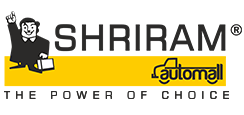
 Download Our App
Download Our App



